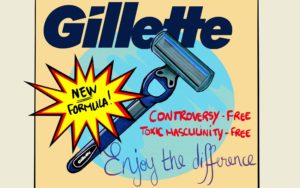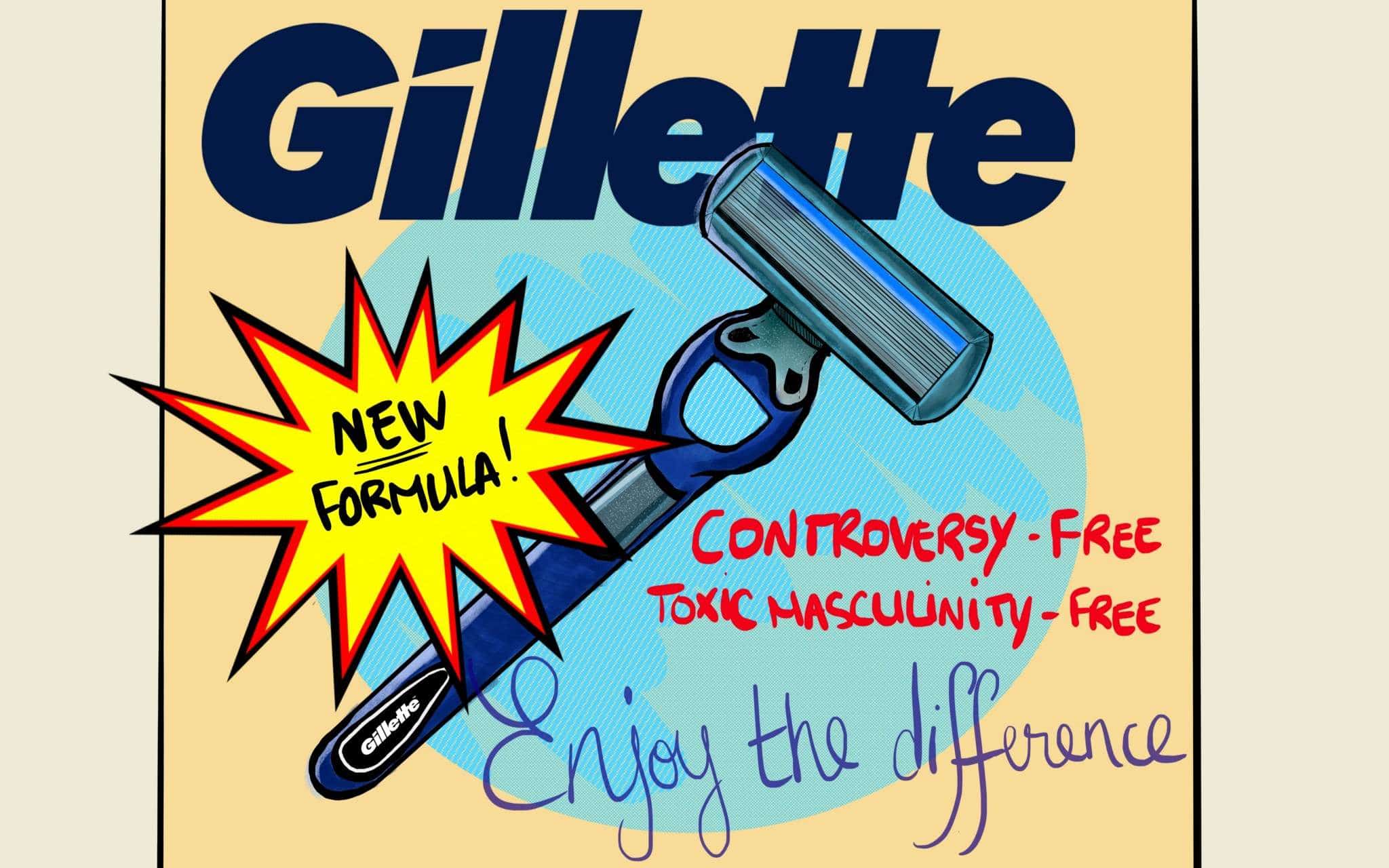
Illustration by Clara Pratelli @TheSundialPress
As we all know, Gillette has recently released a controversial advertisement, exchanging their old slogan of “the best a man can get” to “the best a man can be.” Not only did it condemn the “boys will be boys” answer to everyday sexism, but it also encouraged men themselves to fight toxic masculinity in their everyday life.
The ad was met with a wave of criticism, specifically coming from men, who felt like they themselves and masculinity as a whole were being attacked. A 2013 study shows that males tend to overcompensate by bolstering “traditionally masculine” traits when their masculinity is challenged.
Toxic masculinity, the advert’s target, is specifically that: toxic. It is a practice that legitimizes powerful men’s dominant positions in society and justifies the subordination of women and marginalized men. Not only is it harmful to women, but also detrimental to ourselves. Newly released guidelines by the American Psychological Association for working with men explain how “traditional masculinity” causes men to suppress emotions and mask distress. It has further been shown to make men less willing to seek professional mental health help.
Piers Morgan, a well-known critic of modern feminism, wrote an outraged column about the ad, and while dissecting all of it would be fun, a specific point stood out above the rest. Piers claims that Gillette used to celebrate masculinity and they made one feel good about being a male: “not just because they make you aspire to be a winner and successful achiever, but because they also encourage you to be a good father, son, husband and friend.” The Best Men Can Be is no different in that respect. The ad is calling men to be even better fathers, sons, husbands, and friends. The advert asserts that this includes standing up against bullying, and condemning “locker room talk” that allows men who “grab [women] by the pussy” to be fit for presidency. In 2019, Gillette’s definition of being “a winner and successful achiever, […] a good father, son, husband and friend” involves ending street harassment and other widespread sexist practices enabled by our media and culture.
A recent Sundial Press article has outlined two main problems with the video: the shaming of roughhousing and the lack of an alternative positive model to “replace today’s harassing.” While some research demonstrates the benefits of roughhousing (i.e. play fighting) the problem lies within the fact that it is reserved for boys, which further emphasizes hegemonic masculinity. It creates a binary divide where physicality and strength are reserved for males; emotion and sensitivity for females. Men and women are then stigmatized for not conforming to these socially constructed roles.
It then comes as no surprise that the following section explains that the lack of a father figure in a home results in higher chances of juvenile imprisonment. Firstly, we need to take into account that juvenile incarceration rates are significantly higher for minority groups in the United States. This is part of the American, race-driven, incarceration process that disproportionately jails minorities, especially African-Americans. Talking about juvenile incarceration means tackling the racially biased prison-industrial complex, and not the composition of young men’s households. Black men are imprisoned in the US regardless whether they are fathers who left their families or children from those families. Both juvenile and adult incarceration rates show this racist trend.
The same line of thinking doubles as an attack on single mothers. Our society promotes a heterosexual, nuclear family model, and marginalizes those who do not fit in. Single mothers are attached to an “underclass” and are disadvantaged economically, socially, and culturally. Shamelessly branding single mothers as incapable of raising a boy “well” downplays their struggle against societal barriers and prejudice.
The article then continues to its second grievance: that the ad does not provide a solution to one of the apparent problems of toxic masculinity – sexual harassment. The writer caricatures a traumatic societal ill that touches more than 81% of women, by asking “Is asking a woman to go out on a date without much previous contact sexual harassment?”. It further trivialized the matter, and referred to a rumor of Netflix banning its workers from looking at each other for more than 5 seconds. Netflix has neither confirmed nor denied the rumour, but simply stated that it is proud of its anti-harassment training. There is no simple answer that I, nor a four-minute advertisement, can provide, but brushing the issue off with these types of questions is unacceptable.
Statements such as “with Gillette’s criticism of sexual behavior, it seems more like they would prefer no men to good men,” or “just used a Gillette razor blade to cut off my testicles. No more toxic masculinity for me” are a perfect example of bolstering masculinity in response to feeling threatened. The ad simply calls on men to do better, reflect on themselves, and intervene in unacceptable situations, which nobody should be against. Gillette opened a crucial conversation, that needs to be joined by men who have so far ignored it. It’s a conversation about creating a world that is equal and safe for everyone. A world where we call upon everyone to uphold our fathers, sons, and husbands to be the best they can be.
A big thank you to Laurine Poiret for coauthoring this article and all the work put into it.
Thoughts? Concerns? Write a response to this article by contacting our Opinion editor at miko.lepisto@sciencespo.fr to pitch your idea.
Other posts that may interest you:
Discover more from The Sundial Press
Subscribe to get the latest posts sent to your email.





